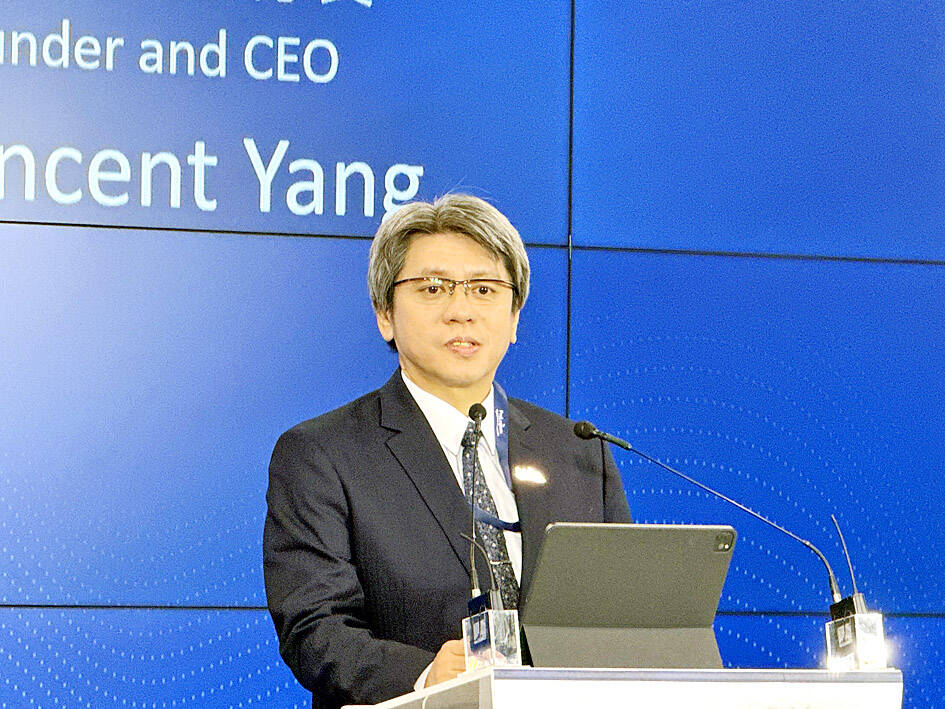ProLogium Technology Co (輝能科技) expects the first electric vehicle (EV) equipped with its solid-state lithium battery to hit the road later this year, the company said yesterday in Taoyuan as it launched the world’s first factory for solid-state batteries for commercial use.
The factory is poised to supply up to 26,000 EVs when it reaches full capacity of 2 gigawatt-hours (GWh) a year, ProLogium Technology said.
The company has invested NT$4.2 billion (US$134.07 million) in the facility, which has initial capacity of 0.5GWh a year, or enough batteries for up to 14,000 vehicles, it said.

Photo: CNA
“This is the world’s first [solid-state lithium battery] mass-
production line, mainly targeting electric cars. EV [automakers] are our future partners,” company founder and chief executive officer Vincent Yang (楊思?) told a media briefing.
“Some projects may enter mass production this year,” Yang said, declining to name which automakers would make such a breakthrough.
Mercedes-Benz is one of ProLogium Technology’s shareholders and has been collaborating with the Taiwanese firm to adopt cost-effective and safer lithium batteries in its next-generation vehicles. Vietnamese automaker VinFast also holds an unspecified stake in ProLogium.
There are also plans for the Taoyuan plant to produce solid-state batteries for electric aircraft, other vessels, drones, robots and devices used in the aerospace industry, Yang said.
The new facility would serve as a demonstration factory for global expansion, particularly in Dunkirk, France, where ProLogium plans to build a 5.2 billion euro (US$5.65 billion) factory, the company said.
The French factory, which is to have an annual capacity of 48Gwh, is to enter mass production in 2027, Yang said.
The company aims to become the world’s biggest solid-state lithium battery supplier between 2030 and 2032, when its French factory reaches full capacity, he said.
By that time, ProLogium would have a 35 to 40 percent share of the world’s solid-state lithium battery market, if the penetration of solid-state lithium batteries makes up 7 percent of the global battery market, he said.
ProLogium expects the manufacturing costs of solid-state lithium batteries to drop to match the costs of ternary lithium batteries — about US$100 per kilowatt-hour — in 2032, Yang said.
ProLogium is the world’s sole supplier for extreme ultraviolet lithography (EUV) tools, a crucial piece of semiconductor manufacturing equipment, as its batteries are able to perform in extreme low-pressure environments, he said.
The Taoyuan factory is expected to serve the company’s Asian customers, while the French site would focus on Europe, the firm said, adding that it would not rule out building a factory in the US to tap that market.

Application-specific integrated circuit designer Faraday Technology Corp (智原) yesterday said that although revenue this quarter would decline 30 percent from last quarter, it retained its full-year forecast of revenue growth of 100 percent. The company attributed the quarterly drop to a slowdown in customers’ production of chips using Faraday’s advanced packaging technology. The company is still confident about its revenue growth this year, given its strong “design-win” — or the projects it won to help customers design their chips, Faraday president Steve Wang (王國雍) told an online earnings conference. “The design-win this year is better than we expected. We believe we will win

Intel Corp chief executive officer Lip-Bu Tan (陳立武) is expected to meet with Taiwanese suppliers next month in conjunction with the opening of the Computex Taipei trade show, supply chain sources said on Monday. The visit, the first for Tan to Taiwan since assuming his new post last month, would be aimed at enhancing Intel’s ties with suppliers in Taiwan as he attempts to help turn around the struggling US chipmaker, the sources said. Tan is to hold a banquet to celebrate Intel’s 40-year presence in Taiwan before Computex opens on May 20 and invite dozens of Taiwanese suppliers to exchange views

Chizuko Kimura has become the first female sushi chef in the world to win a Michelin star, fulfilling a promise she made to her dying husband to continue his legacy. The 54-year-old Japanese chef regained the Michelin star her late husband, Shunei Kimura, won three years ago for their Sushi Shunei restaurant in Paris. For Shunei Kimura, the star was a dream come true. However, the joy was short-lived. He died from cancer just three months later in June 2022. He was 65. The following year, the restaurant in the heart of Montmartre lost its star rating. Chizuko Kimura insisted that the new star is still down

While China’s leaders use their economic and political might to fight US President Donald Trump’s trade war “to the end,” its army of social media soldiers are embarking on a more humorous campaign online. Trump’s tariff blitz has seen Washington and Beijing impose eye-watering duties on imports from the other, fanning a standoff between the economic superpowers that has sparked global recession fears and sent markets into a tailspin. Trump says his policy is a response to years of being “ripped off” by other countries and aims to bring manufacturing to the US, forcing companies to employ US workers. However, China’s online warriors